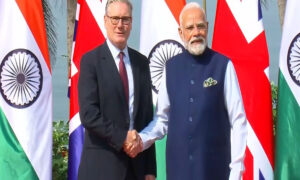
File Picture
It was history written when Rishi Sunak, an Indian by heritage, became the Prime Minister of United Kingdom in October 2022. And it is equally historical for the Labour party to win the recent elections after a whopping gap of 14 years. The Labour party leader Keir Starmer has been appointed the new Britain’s Prime Minister after an audience with King Charles III at Buckingham Palace.
Starmer pledged to start a period of “national renewal” in the U.K. after his opposition Labour party defeated the ruling Conservatives in the general election. In a triumphant victory speech in London after his party secured a majority in parliament., Starmer said, “Today we start the next chapter 3 begin the work of change, the mission of national renewal and start to rebuild our country.” From the Indian perspective, Starmer’s key challenge would be to fast track the already much delayed and most awaited Free Trade Agreement. Though, FTA has been in the Labour manifesto, only time will tell how soon the agreement would be executed.
My government will serve you.
Politics can be a force for good.
The work of change begins today. pic.twitter.com/b5R3VWVUrI
— Keir Starmer (@Keir_Starmer) July 5, 2024
The former British Prime Minister Rishi Sunak conceded defeat in the national election on July 5, saying the opposition Labour Party had won. Sunak said, “The Labour Party has won this general election and I have called Sir Keir Starmer to congratulate him on his victory.”
Sunak took the risk with the sudden and surprising announcement of elections when he had good six months with him, hoping that better economic data would swing public support back towards the Tories. But Thursday’s voting results clearly indicated that Britons wanted to a change by kicking the Tories out of power after 14 years of economic hardships, Brexit upheaval and Tory infighting.
Before heading to Buckingham Palace to tender his resignation as prime minister to King Charles III, Sunak said, “To the country, I would like to say first and foremost, I am sorry. I have given this job my all, but you have sent a clear signal that the government of the United Kingdom must change. And yours is the only judgement that matters. I have heard your anger, your disappointment, and I take responsibility for this loss.”
The scale of the defeat made it inevitable that Sunak would have to step down as Tory head as well. Sunak saw a record number of his top ministerial team lose their seats, including defence secretary Grant Shapps and House of Commons leader Penny Mordaunt. His immediate predecessor as prime minister, Liz Truss, also lost her seat.
Sunak, an observant Hindu who is Britain’s first prime minister of colour, wished his Keir Starmer well, calling him “a decent, public-spirited man who I respect”.
While leaving 10 Downing street, an emotional Sunak said, “One of the most remarkable things about Britain is just how unremarkable it is that two generations after my grandparents came here with little, I could become prime minister. And that I could watch my two young daughters light Diwali candles on the steps in Downing Street. We must hold true to that idea of who we are.”
The 44-year-old was undoubtedly the underdog in the election, coming at the end of a long line of Conservative Party leaders over 14 tough years that underwent some seismic shocks in the form of Brexit and then the COVID pandemic.
It was in the midst of the latter that Sunak shone as Britain’s first Indian-origin Chancellor, stepping up to the seemingly impossible task of reassuring a panicked public about their finances. However, the bond between him and his boss at the time, Boris Johnson, fell prey to the latter’s downward popularity spiral with the scandal of lockdown law-breaking party-gate scandal.
Sunak’s name has already found it’s place in history when he entered 10 Downing Street as the youngest British Prime Minister in 210 years and the country’s very first non-white leader.
[the_ad id=”55725″]


















